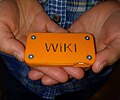 The 2017 set-up of an offline medical library. Anyone physically near to the device may connect to it and download the offline content it contains. |
Internet-in-a-Box (IIAB) is a low-cost digital library, consisting of a wireless access point with storage, which users nearby can connect to. [1] The hardware and software from which it is built has changed since 2012, as miniaturization of storage space and electronics progressed. [2] As of 2017, its hardware often consists of a Raspberry Pi with a replaceable storage card. [1]
Contents
In 2016, Columbia University's Masters in Public Administration in Development Practice (MPA-DP) explored using these boxes in the Dominican Republic for three months. [3]
Distribution of devices assembled by Wiki Project Med Foundation via the Wikipedia Store began in 2024. [4] It ships a Raspberry Pi Zero 2 W with a 256 GB SD card, which contains all of English[ failed verification ] and Spanish[ failed verification ] Wikipedia, among other resources. [4]




